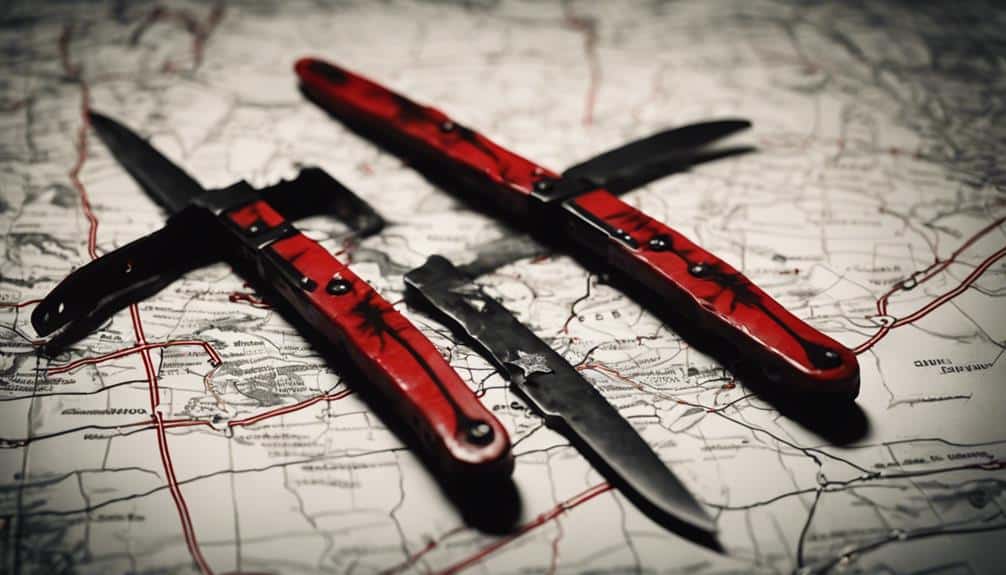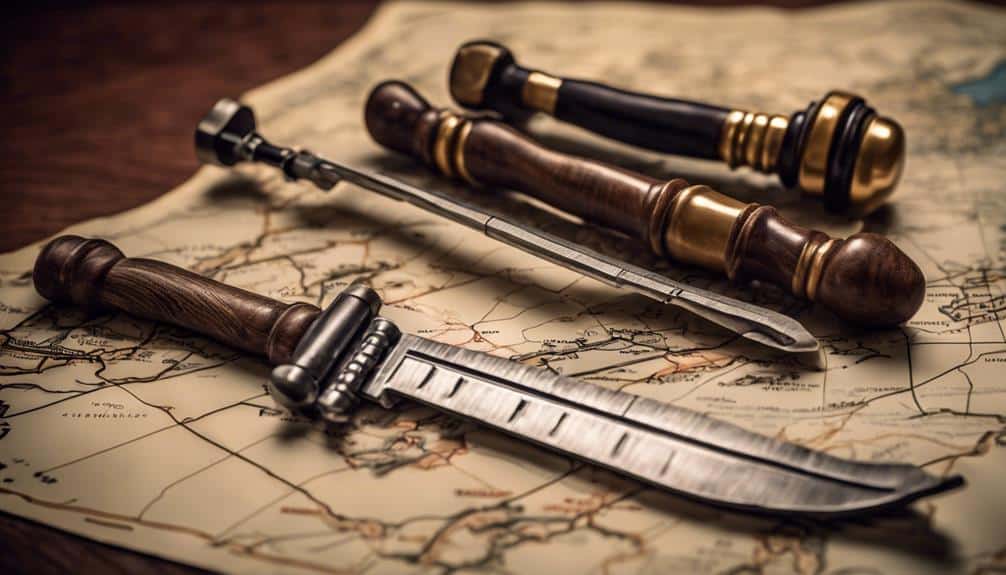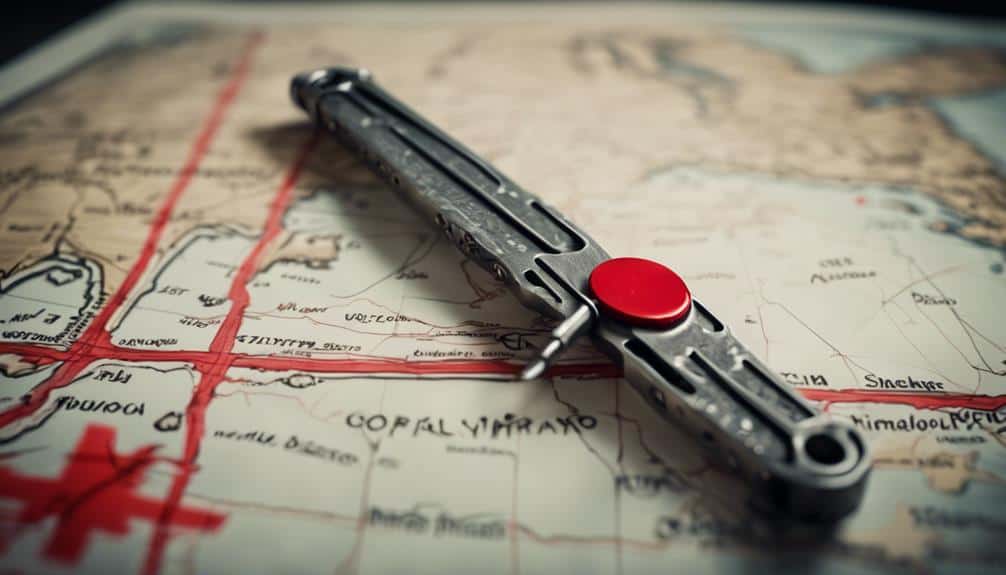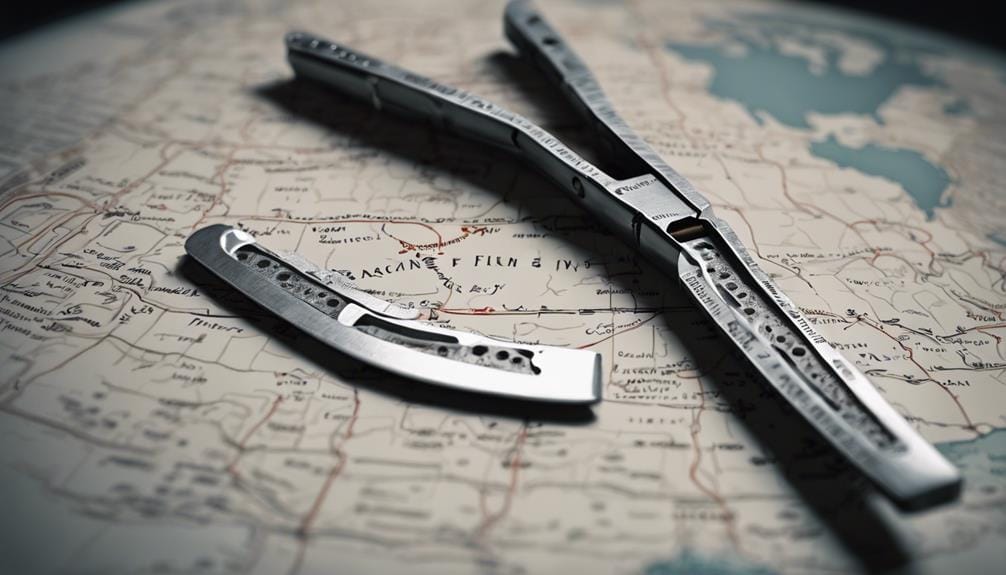In What States Are Butterfly Knives Legal?
You’re probably wondering where you can legally flip a butterfly knife without getting into trouble, right? In about 42 states and Washington D.C., you’re in the clear, but watch out for trouble in California, Hawaii, New Mexico, and Washington—these states totally ban them! Play it smart in places like Wisconsin, Alaska, and Arizona too; they’ve got their own quirky rules. And here’s a kicker—Hawaii’s ban just got the boot, so things are heating up and changing fast. Wanna know which states let you flaunt your knife and where you’ll need to keep it under wraps? There’s a lot more to discover!
 Although butterfly knives might seem like a fascinating addition to your collection, you’re out of luck if you live in California, Hawaii, New Mexico, or Washington, where they are completely banned. In these states, butterfly knives are illegal, and the penalties for owning or carrying one can be severe. We’re talking potential arrest and prosecution, so it’s definitely not something to take lightly.
These total bans are driven by public safety concerns. Lawmakers argue that butterfly knives are often associated with violent crime, making them too dangerous for everyday ownership. If you’re caught with one, expect some serious legal penalties, ranging from hefty fines to possible jail time. It’s essential to know your state laws if you’re a knife enthusiast, to keep yourself out of trouble.
Interestingly, Hawaii has been buzzing with a recent court ruling that deemed the longstanding ban unconstitutional. This has sparked an ongoing debate about the legality of butterfly knives in the state. While the dust settles, it’s still best to steer clear of owning these flashy blades in Hawaii for now. The enforcement and legal landscape can change rapidly, so staying informed is key.
Although butterfly knives might seem like a fascinating addition to your collection, you’re out of luck if you live in California, Hawaii, New Mexico, or Washington, where they are completely banned. In these states, butterfly knives are illegal, and the penalties for owning or carrying one can be severe. We’re talking potential arrest and prosecution, so it’s definitely not something to take lightly.
These total bans are driven by public safety concerns. Lawmakers argue that butterfly knives are often associated with violent crime, making them too dangerous for everyday ownership. If you’re caught with one, expect some serious legal penalties, ranging from hefty fines to possible jail time. It’s essential to know your state laws if you’re a knife enthusiast, to keep yourself out of trouble.
Interestingly, Hawaii has been buzzing with a recent court ruling that deemed the longstanding ban unconstitutional. This has sparked an ongoing debate about the legality of butterfly knives in the state. While the dust settles, it’s still best to steer clear of owning these flashy blades in Hawaii for now. The enforcement and legal landscape can change rapidly, so staying informed is key.
 Legal considerations for owning a butterfly knife can be complex and vary greatly across the United States. It’s a bit of a maze, really. For starters, while butterfly knives are legal in about 42 states and Washington D.C., each state has its own twist on the rules. In some places, like California, Hawaii, New Mexico, and Washington, owning one is a big no-no. Yep, these states have outright bans, so don’t even think about it.
If you’re in Wisconsin or New Hampshire with a felony record, you’re out of luck too. Ownership is restricted for felons there. Alaska has its own quirky regulation—it’s all good to own one, but only for self-defense. Kind of like a “break glass in case of emergency” situation.
Arizona? They want you to be over 21 to own a butterfly knife legally. And if you’re thinking of carrying it around, better check those concealed carry laws—many places frown upon that.
Legal considerations for owning a butterfly knife can be complex and vary greatly across the United States. It’s a bit of a maze, really. For starters, while butterfly knives are legal in about 42 states and Washington D.C., each state has its own twist on the rules. In some places, like California, Hawaii, New Mexico, and Washington, owning one is a big no-no. Yep, these states have outright bans, so don’t even think about it.
If you’re in Wisconsin or New Hampshire with a felony record, you’re out of luck too. Ownership is restricted for felons there. Alaska has its own quirky regulation—it’s all good to own one, but only for self-defense. Kind of like a “break glass in case of emergency” situation.
Arizona? They want you to be over 21 to own a butterfly knife legally. And if you’re thinking of carrying it around, better check those concealed carry laws—many places frown upon that.
 You might wonder why some states ban butterfly knives, and it’s mainly because they’re linked to violent crime and they open super-fast, which scares people. States like California and Washington think these knives are as dangerous as switchblades, so they have strict laws. Even though there’s not much proof they’re used more in crimes, public fear still drives these bans.
You might wonder why some states ban butterfly knives, and it’s mainly because they’re linked to violent crime and they open super-fast, which scares people. States like California and Washington think these knives are as dangerous as switchblades, so they have strict laws. Even though there’s not much proof they’re used more in crimes, public fear still drives these bans.
 Maneuvering the legal gray areas surrounding butterfly knives can be a perplexing endeavor. In Colorado, for instance, they’re not explicitly banned, but you could still face prosecution due to ambiguous local laws. It’s like walking on a tightrope—you never know when you might fall. Then there’s Florida, Illinois, and Maryland, where you can own a butterfly knife, but concealed carry is a big no-no, creating potential legal headaches.
In New Mexico and Washington, total bans on butterfly knives exist, but enforcement can be spotty. Imagine living in a place where something’s banned, but you’re not sure if you’ll actually get in trouble for it. Alaska adds another layer of complexity; you can only use butterfly knives for self-defense, making their legal status a bit of a puzzle.
Understanding this nuanced legal landscape is essential. You don’t want to end up on the wrong side of the law because of some obscure local ordinance. Here’s a handy table to break it down:
Maneuvering the legal gray areas surrounding butterfly knives can be a perplexing endeavor. In Colorado, for instance, they’re not explicitly banned, but you could still face prosecution due to ambiguous local laws. It’s like walking on a tightrope—you never know when you might fall. Then there’s Florida, Illinois, and Maryland, where you can own a butterfly knife, but concealed carry is a big no-no, creating potential legal headaches.
In New Mexico and Washington, total bans on butterfly knives exist, but enforcement can be spotty. Imagine living in a place where something’s banned, but you’re not sure if you’ll actually get in trouble for it. Alaska adds another layer of complexity; you can only use butterfly knives for self-defense, making their legal status a bit of a puzzle.
Understanding this nuanced legal landscape is essential. You don’t want to end up on the wrong side of the law because of some obscure local ordinance. Here’s a handy table to break it down:
Navigating these laws might seem intimidating, but knowing the specifics can keep you out of hot water.
States With Total Bans

States With Restrictions
While some states have outright banned butterfly knives, others impose specific restrictions that you’ll need to navigate carefully. It’s important to understand these local laws and regulations to avoid any legal issues when owning a butterfly knife. For instance, in Wisconsin, if you have a felony conviction, you’re prohibited from owning a butterfly knife. This makes sense—lawmakers want to keep potentially dangerous tools out of the wrong hands. In Alaska, you can only use a butterfly knife for self-defense, which might limit its practical applications but guarantees it’s there when you need it most. Arizona has an age restriction, requiring you to be over 21 to legally possess a butterfly knife. This age limit aims to guarantee that only mature individuals handle such knives. New Hampshire, on the other hand, disallows ownership for individuals with felony drug arrests or violent felony convictions, adding another layer of caution. Here’s a quick rundown of some states with restrictions:- Wisconsin: No ownership for individuals with felony convictions.
- Alaska: Only for self-defense situations.
- Arizona: Must be over 21 years old.
- New Hampshire: No ownership for individuals with felony drug arrests or violent felony convictions.
Legal Considerations

Recent Legal Changes
Maneuvering the maze of butterfly knife laws just got even more intricate. In August 2023, the Ninth Circuit Court declared Hawaii’s 30-year ban on butterfly knives unconstitutional, invoking Second Amendment protections. This decision has sparked a wildfire of debates among state attorneys general. For instance, Michigan is already pushing for reinstating bans, claiming these knives pose considerable risks. The legal consequences of carrying a butterfly knife can be severe, so staying informed is vital. Interestingly, the status of butterfly knives remains unchanged in some states. In California, New Mexico, and Washington, these knives are still completely banned. Arizona, on the other hand, demands that owners are over 21 years old, and New Hampshire places restrictions based on felony convictions. These variations in state laws are important to note, as they highlight the complexities involved. Here’s a quick rundown of the recent legal changes:- Hawaii: Ban lifted by Ninth Circuit Court ruling.
- Michigan: Debating reinstatement of the ban.
- California, New Mexico, Washington: Bans remain intact.
- Arizona and New Hampshire: Specific age and conviction-based restrictions.
Why Some States Ban Them

Association With Violent Crime
Butterfly knives, often glamorized in movies and TV shows as the go-to weapon for criminals, have garnered a reputation that contributes to their prohibition in some states. You’ve probably seen them in action-packed scenes, flipping open with a flick of the wrist, adding to their allure and mystery. This portrayal, however, has led to some misconceptions, making them illegal in certain places due to their association with violent crime. In many states in America, the legislation surrounding butterfly knives is strict because:- Media Influence: They’re often shown as the weapon of choice for bad guys, which fuels public fear.
- Rapid Deployment: Their quick opening mechanism is seen as a threat, making them comparable to switchblades.
- Misconceptions: Despite their menacing image, most fatal knife attacks involve other types of knives, not butterfly knives.
- Legislative Action: Laws are influenced more by their portrayal in popular culture than by actual crime data.
Rapid Deployment Concerns
The allure of butterfly knives often lies in their rapid deployment, a feature that’s both a fascination and a concern. You might think it’s cool how quickly these knives can snap open, but that’s also what makes them a red flag for lawmakers. Their quick-access nature means they can be ready for action faster than standard folding knives, raising eyebrows about public safety and law enforcement challenges. Imagine a scene from an action movie where the bad guy whips out a butterfly knife in the blink of an eye. That’s the kind of image that fuels fear and leads to banning these knives in several states. Their association with violent crime, whether justified or not, influences legal restrictions. Some states lump them in with switchblades and gravity knives, which are already under strict regulations, further justifying the bans due to perceived weaponry risks. Even though there’s no solid data proving butterfly knives are used more in crimes compared to other knives, their rapid deployment contributes to a negative public perception. Add in media portrayals of criminals favoring these flashy blades, and you’ve got a recipe for legal restrictions and outright bans.States Allowing Ownership
Let’s talk about where you can actually own a butterfly knife without too much hassle. In states like Alabama, Alaska, and Arizona, you’re good to go, but watch out for concealed carry rules. Then there’s Colorado, where things get murky; you could own one, but it might still land you in hot water.States Permitting Open Carry
When it comes to owning and openly carrying butterfly knives, you’ll find that regulations vary widely across the United States. In many states, you’re free to own these flashy, flipping blades, but carrying them openly is a different story. Let’s explore some states that permit open carry of butterfly knives.- Alabama: You can own butterfly knives, but if you want to carry them, make sure it’s visible. Concealed carry often requires additional permits.
- Alaska: Feel free to show off your butterfly knife skills, as open carry is perfectly legal here.
- Arizona: Similar to Alaska, Arizona allows open carry of butterfly knives without any fuss.
- New Hampshire: While you can openly carry your butterfly knife, individuals with felony drug arrests or violent felony convictions are prohibited from owning them.
Conditional Ownership States
While some states permit the open carry of butterfly knives, others impose specific conditions on their ownership. You’ll find that in certain states, owning a butterfly knife isn’t as straightforward as just buying one. Take Wisconsin, for instance. If you’ve got a felony conviction, especially for something serious like a felony drug arrest, you’re out of luck. They stress background checks to make sure only eligible folks can own these knives. Alaska, on the other hand, is more lenient but with a twist. You can own a butterfly knife, but you better only use it for self-defense. They’re pretty strict about this, so handle it responsibly. In Arizona, you’ve got to be over 21. That’s right, there’s an age restriction. So, if you’re a young enthusiast, you’ll have to wait a bit. New Hampshire takes it a step further by banning ownership for anyone with a felony drug arrest or violent felony convictions. They’re all about careful screening. Then there’s Colorado, which is a legal gray area. Butterfly knives aren’t explicitly banned, but you might still face prosecution depending on the situation. It’s tricky, so tread carefully.Concealed Carry Restrictions
Maneuvering concealed carry laws for butterfly knives can be tricky, even in states where ownership is legal. You might think owning a butterfly knife is the end of the legal maze, but carrying it concealed is a whole different story. States like Alabama, Alaska, and Arizona allow you to own these knives, but they draw a hard line at concealed carry—it’s generally restricted or outright illegal. In New Hampshire, you can own a butterfly knife, but if you’ve got a felony drug arrest or a violent felony conviction, you’re out of luck. No knife for you! Wisconsin takes it a step further, prohibiting anyone with felony convictions from owning these flashy blades, emphasizing the need for thorough background checks. Here’s a quick rundown to help you navigate:- Alabama, Alaska, Arizona: Ownership is fine, concealed carry is not.
- Wisconsin: No ownership if you have a felony conviction.
- New Hampshire: Ownership is fine unless you have specific felony convictions.
- Oregon, Utah: Ownership is okay, but concealed carry is illegal.
Legal Gray Areas

| State | Legal Status | Notes |
|---|---|---|
| Colorado | Legal gray area | Ambiguous local laws |
| Florida | Legal to own, no concealed carry | Potential legal complications |
| New Mexico | Total ban | Varied enforcement |
| Washington | Total ban | Varied enforcement |
| Alaska | Self-defense only | Complex legal status |
Responsible Ownership Tips
Responsible ownership of butterfly knives starts with a thorough understanding of your local laws. Before you even think about picking up a butterfly knife, you need to verify local laws. Trust me, you don’t want to end up in hot water just because you didn’t do your homework. Regulations vary widely by state and can change faster than the latest TikTok trend. Additionally, consider the unique design features and specifications of the knife you own, such as the well-balanced design for flipping that can enhance your skills. Here are some key responsible ownership tips:- Verify Local Laws: Always check the specific regulations for your state and keep an eye out for updates. Ignorance isn’t bliss when it comes to the law.
- Practice Safe Handling: Use a balisong trainer with a dull blade to flip tricks and refine your skills without risking any nasty cuts.
- Secure Storage: Keep your butterfly knife in a safe place, out of reach of children and anyone who shouldn’t have it. Better safe than sorry!
- Avoid Public Use: Be mindful of your surroundings and don’t whip out your butterfly knife in public spaces. It’s not worth the potential legal consequences or the sideways glances.
Frequently Asked Questions
What States Is a Butterfly Knife Illegal In?
You need to know butterfly knife regulations. In California, Hawaii, New Mexico, and Washington, knife ownership laws make them completely illegal. For self-defense weapons, check knife collector guidelines and urban knife policies in your state.In What States Are Switchblade Knives Illegal?
Have you ever wondered about switchblade laws? In states like California and New York, knife regulations are strict due to their classification as dangerous self-defense weapons. Violating these laws can lead to serious legal consequences.Is a Butterfly Knife Illegal in Texas?
Yes, you can legally own and carry a butterfly knife in Texas. Texas knife laws don’t classify them as illegal. If you’re interested in knife self-defense, butterfly knife training, or building a legal knife collection, you’re covered.Is a Butterfly Knife a Switchblade?
A butterfly knife isn’t a switchblade. Understanding butterfly knife history helps clarify this. Legal definitions vary, but both have distinct mechanics. Focus on knife safety and their appeal in knife collection or tactical uses, not misconceptions.
Facebook
Twitter
LinkedIn
Pinterest
X
Joseph Lombardi
Joseph Lombardi is an esteemed Army combat veteran whose valor and leadership were honed during Operation Iraqi Freedom. His military career is marked by exemplary service and dedication, earning him numerous commendations for bravery and tactical prowess. Transitioning from the battlefield to the business world, Joseph channeled his extensive experience into founding Para Bellum Defense, a premier self-defense products company.
As the owner and CEO of Para Bellum Defense, Joseph brings a unique blend of military discipline and strategic acumen to the forefront of the self-defense industry. His company specializes in innovative and reliable products designed to empower individuals and ensure their safety in an increasingly uncertain world. Under his leadership, Para Bellum Defense has rapidly gained a reputation for excellence, driven by Joseph's unwavering commitment to quality and customer satisfaction.
In addition to his entrepreneurial success, Joseph boasts a decade-long career in executive protection and security. His expert skills in threat assessment, risk management, and personal protection have made him a sought-after professional in the field. Joseph's dedication to safeguarding others extends beyond his professional endeavors, as he actively participates in community outreach programs aimed at promoting safety and self-defense awareness.
With a firm belief in preparedness and empowerment, Joseph Lombardi continues to inspire and protect, embodying the true spirit of a warrior and a guardian.


2 Responses